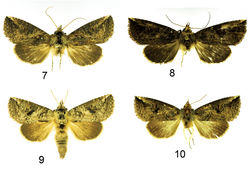Difference between revisions of "Elasmia mandela"
m (Imported from ZooKeys) |
m (1 revision) |
(No difference)
| |
Latest revision as of 13:32, 24 November 2011
| Notice: | This page is derived from the original publication listed below, whose author(s) should always be credited. Further contributors may edit and improve the content of this page and, consequently, need to be credited as well (see page history). Any assessment of factual correctness requires a careful review of the original article as well as of subsequent contributions.
If you are uncertain whether your planned contribution is correct or not, we suggest that you use the associated discussion page instead of editing the page directly. This page should be cited as follows (rationale):
Citation formats to copy and paste
BibTeX: @article{Metzler2011ZooKeys149, RIS/ Endnote: TY - JOUR Wikipedia/ Citizendium: <ref name="Metzler2011ZooKeys149">{{Citation See also the citation download page at the journal. |
Ordo: Lepidoptera
Familia: Notodontidae
Genus: Elasmia
Name
Elasmia mandela (Druce, 1887) – Wikispecies link – Pensoft Profile
Description
Overall color dark gray brown with obscure transverse forewing markings. Males and females similar in appearance. Male antenna narrowly bipectinate in basal ¾, with dense setae on ventral surface. Female antenna filiform for entire length, with sparse setae. Apex of forewing with a diagonal white mark. Reniform spot outlined with pale-orange scales, not contrasting. Forewing length in males 17.0–18.0 mm (mean = 17.2 mm, n = 5), and in females 18.0–20.0 mm (mean = 19.3 mm, n = 7). Male genitalia distinguished by uncus with abruptly widening sides, like a manta ray, and robust saccular area (Barth’s Organ). Female genitalia with membranous papilla anales that are partially hidden from view. Ductus bursae broad and short, dorso-ventrally compressed; corpus bursae round in profile, with a single shark tooth shaped signum, also with a heavily-sclerotized, perpendicular, thumb-like projection ventrally and a sclerotized finger-like pocket appressed to corpus bursae dorsally.
Remarks
Druce (1887)[1] described Elasmia mandela from Presidio, Mexico, based on a single female specimen. We examined a photograph of the type and it’s genitalia. We also examined specimens from Vera Cruz and Yucatan, Mexico (AMNH), and from Costa Rica (JBS).
Distribution and biology
Elasmia mandela occurs in Mexico and Costa Rica. Its distribution in other Central American countries is unknown. The larval hosts in Costa Rica are one species of Rhamnaceae and 22 species of Sapindaceae (Janzen and Hallwachs 2009[2]).
Taxon Treatment
- Metzler, E; Knudson, E; 2011: A new species of Elasmia Möschler from New Mexico and Texas, and a new subspecies of Elasmia mandela (Druce) from Texas and Oklahoma (Lepidoptera, Notodontidae, Nystaleinae) ZooKeys, 149: 51-67. doi
Other References
- ↑ Druce H (1887) Insecta. Lepidoptera-Heterocera Volume 1 In: Godman FD, Salvin O (Eds), Biologia Centrali-Americana, London, England, 490 pp.
- ↑ Janzen D, Hallwachs W (2009) Area de Conservación Guanacaste (ACG), northwestern Costa Rica, caterpillars, pupae, butterflies & moths. [accessed 3 March 2011: http://janzen.sas.upenn.edu/caterpillars/database.lasso]
Images
|
